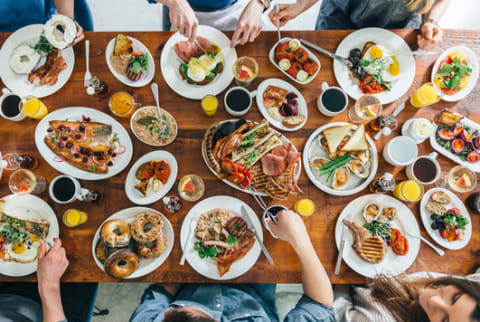Advertisement

There’s nothing like sharing food with people you enjoy spending time with. It’s deeply satisfying and nourishes us way beyond physical hunger. Eating with other people also satisfies our needs for community, belonging, safety, and love.
It’s also all too easy to get caught up in the energy of being with friends and overeat. I’ve come home from plenty of dinner parties or friends’ houses uncomfortably full and berating myself for having mindlessly eaten too much.
Here are eight powerful ways to stay connected to your body’s cues and avoid overeating when you’re out with friends:
1. Set a loving intention.
Set an intention before you meet up with people that you’re going to stay lovingly connected to your body and willing to listen to its cues, even when they’re only a whisper.
2. Pay attention to the people you’re with.
When you get there, focus on experiencing connection with other people. Sometimes eating in social situations can be a way to hide from being intimate with people. At a dinner table, place your fork down between bites and look people in the eye. Listen to what they’re saying. Lean back in your chair and let yourself get immersed in the conversation. Or if you’re at a cocktail party, try striking up a conversation with someone first before heading to the snack table.
3. Avoid emotional conversations while eating.
If you’re out with friends and you feel triggered by a topic of conversation or by someone’s behavior, put your fork down and either address the situation, sit quietly, or excuse yourself. Eating can be a way to “stuff down” feelings and avoid awkward situations. Plus, if you eat while you’re upset, you strengthen the subconscious connection between being upset and eating, which can make you more likely to eat when you’re upset in the future.
4. Eat what your body wants.
Do your best to honor your hunger cues and eat what your body wants. While your mind might be desperately attracted to the chocolate cake on the dessert table, consider how your body might feel afterward. If it’s available to you, make a plate of what your body wants and sit down in a relaxed environment while you eat.
5. Take a break to check in with yourself.
In the middle of your meal or halfway through the party, take a break to check in with how you feel. Get up and go to the bathroom or walk outside for some fresh air. Place your hand on your belly, take a breath, and notice if you’re still hungry for more food—or maybe something else.
6. Be OK with not finishing everything.
Try to let go of the idea that you have to finish everything on your plate, even if you’re afraid you might upset your host. Consider what’s more important to you: possibly upsetting the host or leaving the party feeling uncomfortable and bloated? Also, consider what you would prefer if you were a host: your guests enjoying their time or feeling obliged to be uncomfortable to make you happy? Give yourself permission to leave food on your plate, and you can always ask to take it home. The truth is, you’re probably not being judged as much as you think you are.
7. Give yourself something to look forward to.
Sometimes we keep eating because we’re postponing what’s next. There have been plenty of times when I have kept eating because I’m not enjoying the conversation and really just want to go home but feel rude leaving early. Give yourself permission to go home early. Or maybe plan a fun after-dinner activity. Give yourself something nourishing to look forward to so food does not become the main source of enjoyment.
8. Celebrate your wins.
A powerful way to make any positive change is to shrug off mistakes and celebrate your wins. Even if you overeat while you’re out with friends, give yourself credit for any effort you’ve made to stay connected to yourself and honor your body, no matter how small. Even if you completely forgot to chew your food except for your very last bite, celebrate that last bite. Every positive step you take is an accomplishment, and the more we celebrate each one, the easier it is to get to where we want to be.
